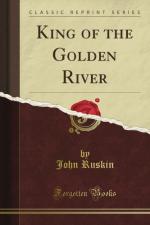|
This section contains 173 words (approx. 1 page at 300 words per page) |

|
The King of the Golden River has a clearly stated moral at the end: "And thus the Treasure Valley became a garden again, and the inheritance, which had been lost by cruelty, was regained by love." However, though the values of the characters express an obvious conflict between a spirit of Christian charity and sins such as pride and avarice, Ruskin does not treat these themes in terms of Christian dogma. The moral aspect of the work is always secondary to Ruskin's main objective: to tell a truly marvelous and entertaining fairy tale, which is very much in the tradition established by the Brothers Grimm.
Contemporary readers may be disturbed by the absence of female characters in the tale. However, the fact that nineteenth-century writers in general viewed men and women differently than we do may be responsible. Fairy tales are not meant to present accurate...
|
This section contains 173 words (approx. 1 page at 300 words per page) |

|




